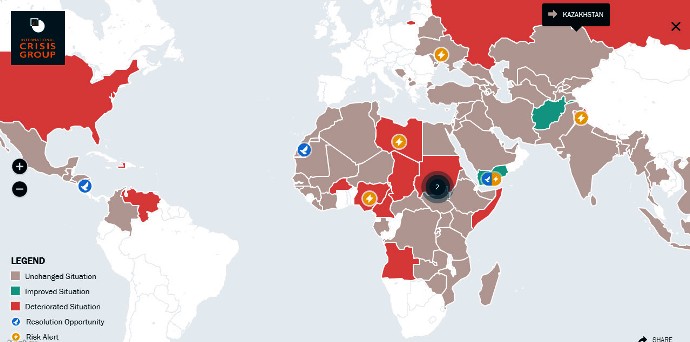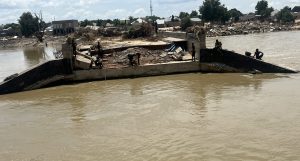Tracking Conflict Worldwide

By International Crisis Group
CrisisWatch is our global conflict tracker, a tool designed to help decision-makers prevent deadly violence by keeping them up-to-date with developments in over 70 conflicts and crises, identifying trends and alerting them to risks of escalation and opportunities to advance peace.February saw a dangerous escalation between India and Pakistan. In Yemen, the warring parties took a small step to cement a ceasefire in Hodeida, but a breakdown of talks could trigger new clashes. Fighting in Libya’s south intensified and could worsen, and Chad called in French airstrikes to halt a rebel advance. Al-Shabaab stepped up deadly attacks in Somalia, and in South Sudan a government offensive against rebels in the south is picking up steam. Sudan’s President al-Bashir took a harder line against persistent protests. Suspected jihadists stepped up attacks in Burkina Faso; violence escalated in Cameroon’s Anglophone region; and Angola’s separatists announced a return to arms. In Nigeria, election-related violence rose and could flare again around polls to elect governors in March, while there are growing concerns around Ukraine’s upcoming presidential vote. The confrontation hardened between Venezuelan President Maduro and opposition leader Juan Guaidó. In Haiti, anti-government protests turned violent. U.S.-Russia relations deteriorated further in a worrying development for the future of arms control. On a positive note, Taliban and U.S. officials resumed talks on a deal for Afghanistan, negotiations aimed at ending the Western Sahara conflict are planned for March, and Nicaragua’s government resumed dialogue with opposition leaders, raising hopes for an end to the political crisis.Trends and OutlookIn February, relations between India and Pakistan deteriorated dramatically after Pakistani-based militants drove a suicide car bomb into a convoy of Indian security forces in Kashmir, killing at least 40 security personnel in the deadliest terrorist attack there in over 30 years. Tensions spiked as both countries carried out airstrikes across the Line of Control that divides Indian and Pakistan-administered Kashmir, while India carried out security sweeps and arrested scores of alleged militant sympathisers in Indian-administered Jammu and Kashmir. While both sides have said they want to avoid further escalation, their armies continue to clash across the Line of Control. We call on both Pakistan and India to exercise restraint and rethink policies that have contributed to this conflagration.Yemen’s warring parties moved an important inch forward in implementing the December Stockholm Agreement: the government and Huthis agreed to redeploy their forces from frontline positions in and around the Red Sea port of Hodeida. But they haven’t done so yet because they can’t agree on what should happen next . They may work it out, but equally talks could collapse, potentially triggering new violence. In Afghanistan, U.S. and Taliban negotiators resumed peace talks in Doha in meetings the U.S. described as productive, while Taliban representatives and a wide range of Afghan political figures met in Moscow in an unprecedented public meeting.Libya’s south saw heavy fighting as strongman Khalifa Haftar’s forces continued to consolidate control. Worse could follow in coming weeks if his move sparks a tribal war or if groups in the north allied with the Tripoli-based government retaliate. In early February, Chadian rebels based in southern Libya launched an incursion into north east Chad, their sights set on overturning Déby’s regime. At the government’s request, French airstrikes halted their advance, but Déby’s call for help shows his army, often portrayed as strong, has its weaknesses .Facing the longest wave of protests since independence, Sudan’s President al-Bashir declared a state of emergency, empowering the army. The decision signals his intent to confront protesters with violent repression and moves Sudan onto dangerous new ground . Western partners and Gulf states should urge Bashir to refrain from a bloody crackdown and step aside to make way for a broad-based transitional government that can usher in reforms.Election-related violence rose around Nigeria’s polls leaving at least 40 dead, with a last-minute delay heightening tensions . President Buhari has won a second term, but his main challenger Atiku Abubakar rejected the result. With the political temperature still at boiling point, more violence could erupt around governorship polls set for 9 March. In Cameroon’s Anglophone west, over 100 separatists, security personnel and civilians were killed and Boko Haram upped attacks in the Far North. Separatist militants in Angola’s Cabinda exclave announced they would resume their armed struggle.Al-Shabaab stepped up attacks in Somalia’s capital Mogadishu and rural areas, as more African Union troops pulled out. Despite an overall easing of South Sudan’s war, a government offensive against rebels in the south gained momentum and fighting could escalate in March. Security in Burkina Faso continued to deteriorate as suspected jihadists increased attacks on civilians and security forces, especially in the north and east.Deteriorating relations between the U.S. and Russia took a worrying turn as Washington announced it was suspending its obligations under the 1987 Intermediate-Range Nuclear Forces Treaty, raising concerns about the future of arms control. As Ukraine prepares for presidential elections in late March, an increasingly contentious campaign marked by allegations of irregularities and warnings of Russian interference prompted concerns over potential disputes around the result.Venezuela’s turmoil continued as the confrontation between President Maduro and opposition leader Juan Guaidó – recognised by dozens of countries as the country’s interim president – hardened, and several people were killed in a standoff over deliveries of international humanitarian aid. We continue to call for all sides to give priority to genuine negotiations leading to free and fair elections. Violent anti-government protests swept Haiti, fuelled by anger over deteriorating economic conditions and a scandal involving embezzlement of public funds.On a more hopeful note, after talks between Morocco and the Polisario Front independence movement resumed in December after six years, a second round planned for March presents an opportunity to move toward settling the contested status of Western Sahara. And in a welcome development in Nicaragua, President Ortega’s government agreed to resume the national dialogue with opposition leaders, giving hope for a route out of the country’s devastating political crisis.







